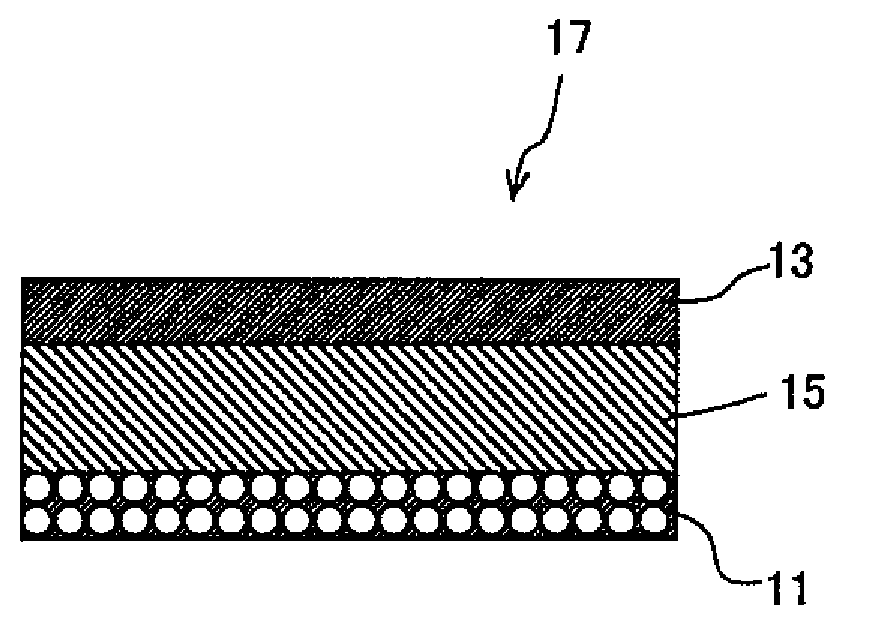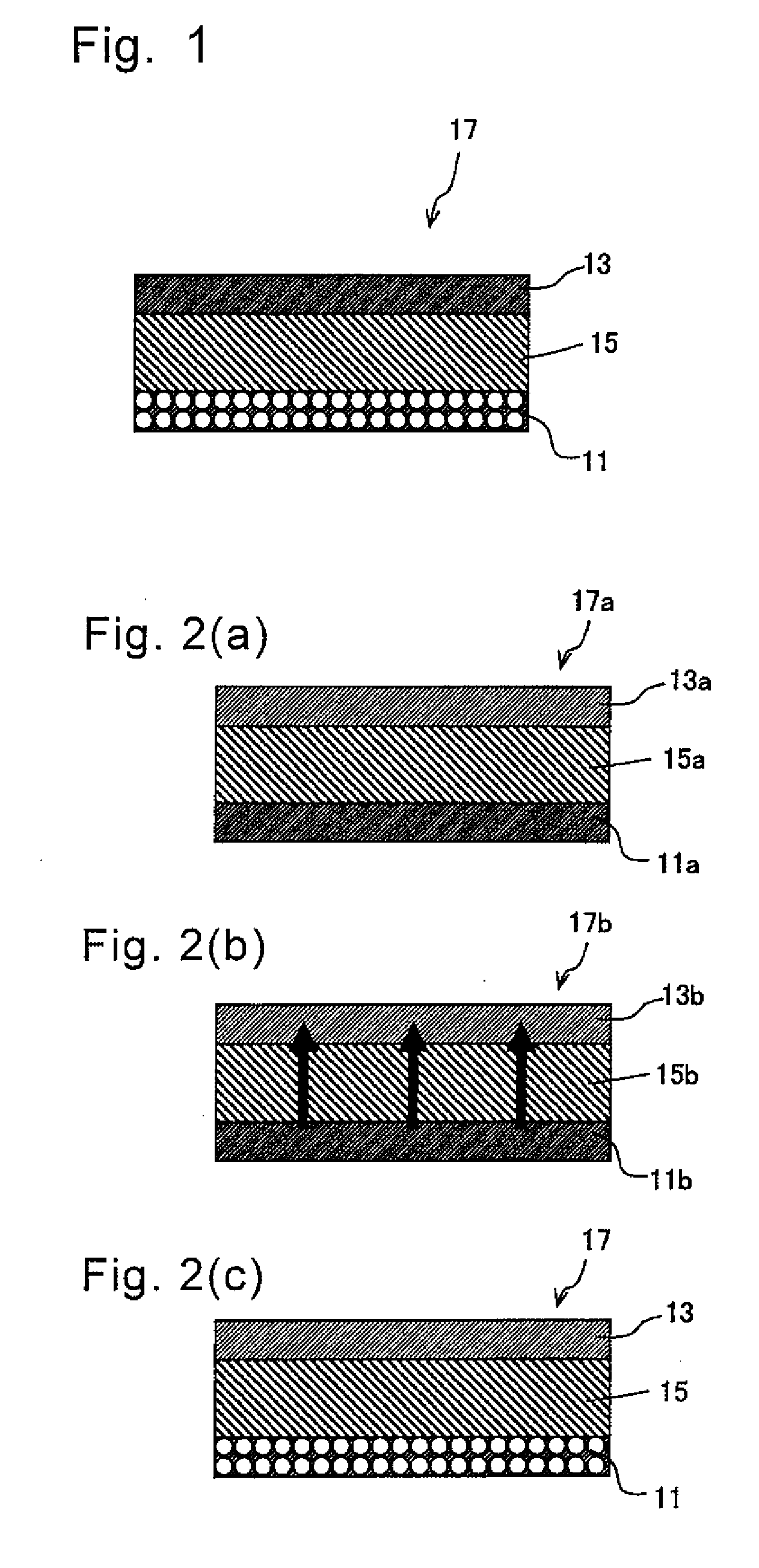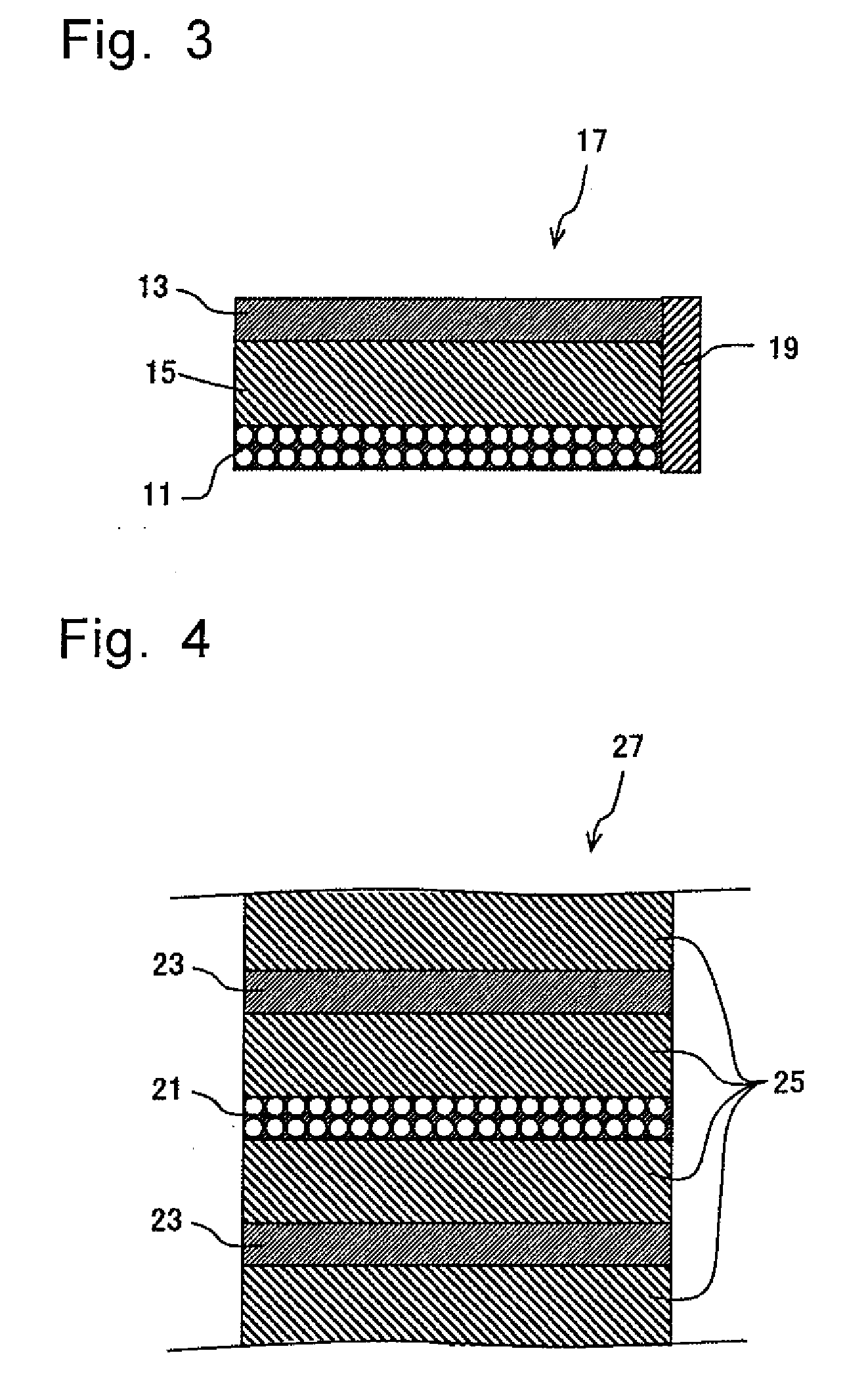Method for Manufacturing Ceramic Member, and Ceramic Member, Gas Sensor Device, Fuel Cell Device, Multi-Layer Piezoelectric Device, Injection Apparatus and Fuel Injection System
a technology of ceramic parts and ceramic components, which is applied in the field of ceramic parts manufacturing, can solve the problems of device consuming more electricity and insufficient sintering of electrodes
- Summary
- Abstract
- Description
- Claims
- Application Information
AI Technical Summary
Benefits of technology
Problems solved by technology
Method used
Image
Examples
example 1
Gas Sensor
[0236]A gas sensor device comprising a ceramic member of the present invention was manufactured as follows. First, a zirconia powder consisting mainly of a stabilized zirconia (5 mol % Y2O3-containing ZrO2) powder having a mean particle size of 0.4 μm, a glass powder, a binder, and a plasticizer were mixed to prepare a slurry. The slurry was formed into a ceramic green sheet having a thickness of 150 μm by a doctor blade method.
[0237]Then, on one surface of the ceramic green sheet, an electrically conductive paste prepared by adding a binder to a raw powder such as a silver alloy powder with the composition shown in Table 1 was printed in a thickness of 30 μm using a screen printing method. At this time, with respect to the portion to be provided with a heating element, a heating element pattern was printed in the shape of a folded zigzag shape. Then, the respective green sheets were stacked to obtain a stacked compact having a shape shown in FIG. 14. Regarding the positio...
example 2
Fuel Cell
[0243]A fuel cell device comprising a ceramic member of the present invention was manufactured as follows. First, a zirconia powder consisting mainly of a cordierite (5 mol % Y2O3-containing ZrO2) powder having a mean particle size of 0.4 μm, a glass powder, a binder, and a plasticizer were mixed to prepare a slurry. The slurry was formed into a ceramic green sheet having a thickness of 150 μm by a doctor blade method.
[0244]On one surface of the ceramic green sheet, an electrically conductive paste prepared by adding a binder to a raw powder such as a silver alloy powder with the composition shown in Table 2 was printed in a thickness of 30 μm using a screen printing method. Then, the respective green sheets were stacked to obtain a stacked compact having a shape shown in FIG. 17. Regarding the position where a predetermined thickness of a ceramic layer is required, a required number of only green sheets were stacked without printing the electrically conductive paste.
[0245]...
example 3
Multi-Layer Piezoelectric Device
[0249]A multi-layer piezoelectric device comprising a ceramic member of the present invention was manufactured as follows. First, a raw powder consisting mainly of a lead titanate zirconate (PZT) powder having a mean particle size of 0.4 μm, a binder, and a plasticizer were mixed to prepare a slurry. The slurry was formed into a ceramic green sheet having a thickness of 150 μm by a doctor blade method. On one surface of the ceramic green sheet, an electrically conductive paste prepared by adding a binder to a raw powder such as a silver alloy powder with the composition shown in Table 3 was printed in a thickness of 30 μm using a screen printing method. To a metallic paste layer for forming a lump containing layer 95, a lead titanate zirconate (PZT) powder having a mean particle size of 0.4 μm was added in the amount of 1% by mass based on the metal powder.
[0250]Then, green sheets were stacked to obtain a stacked compact having a shape shown in FIG. 1...
PUM
| Property | Measurement | Unit |
|---|---|---|
| Fraction | aaaaa | aaaaa |
| Fraction | aaaaa | aaaaa |
| Fraction | aaaaa | aaaaa |
Abstract
Description
Claims
Application Information
 Login to View More
Login to View More - R&D
- Intellectual Property
- Life Sciences
- Materials
- Tech Scout
- Unparalleled Data Quality
- Higher Quality Content
- 60% Fewer Hallucinations
Browse by: Latest US Patents, China's latest patents, Technical Efficacy Thesaurus, Application Domain, Technology Topic, Popular Technical Reports.
© 2025 PatSnap. All rights reserved.Legal|Privacy policy|Modern Slavery Act Transparency Statement|Sitemap|About US| Contact US: help@patsnap.com



